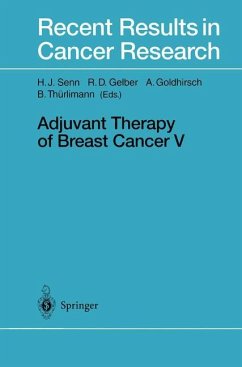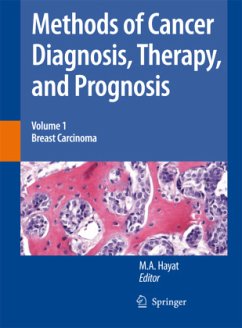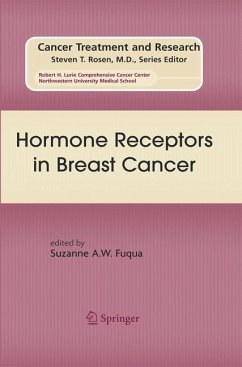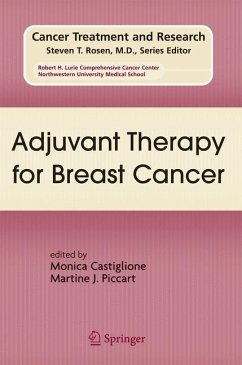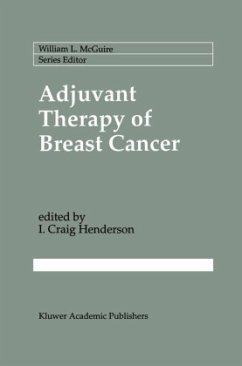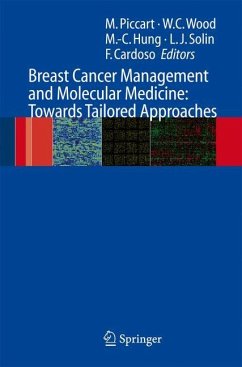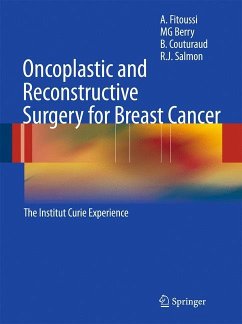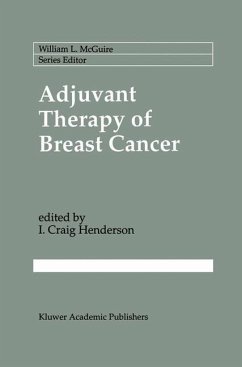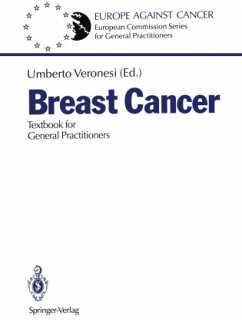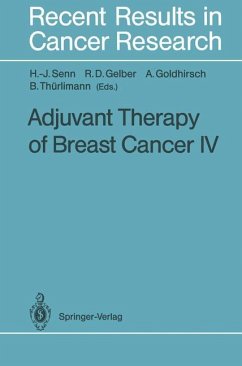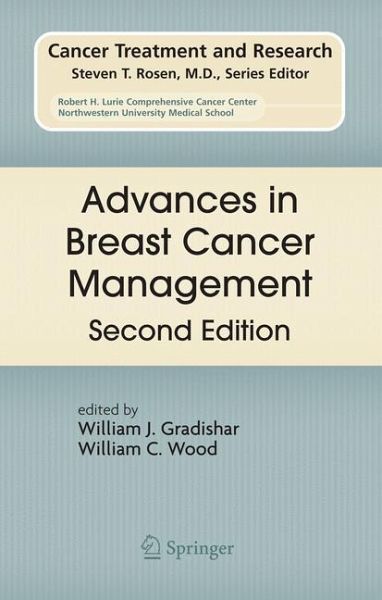
Advances in Breast Cancer Management

PAYBACK Punkte
57 °P sammeln!
Over the last 5 years significant advances have been made in our understanding of the biology of breast cancer. As a result of linking observations made in the laboratory to new treatment strategies, the outcome of breast cancer patients with both early and late stage disease has continued to improve. This volume will highlight many of the important advances that have improved our understanding of the biology and therapeutics of breast cancer.The initial discussion will focus on the evolving understanding of the genetics of breast cancer. (Olapade or Pasche) In addition to the well known genet...
Over the last 5 years significant advances have been made in our understanding of the biology of breast cancer. As a result of linking observations made in the laboratory to new treatment strategies, the outcome of breast cancer patients with both early and late stage disease has continued to improve. This volume will highlight many of the important advances that have improved our understanding of the biology and therapeutics of breast cancer.
The initial discussion will focus on the evolving understanding of the genetics of breast cancer. (Olapade or Pasche) In addition to the well known genetic mutations BRCA1 and BRCA2, other mutations that have recently been identified will be discussed. In addition, strategies for surveillance of high-risk populations and prevention strategies under evaluation are highlighted. The underlying molecular pathways that control malignant cell growth are being better characterized thru laboratory investigation and as a result of this work numerous novel therapeutics that target these pathways in already in the clinic to define whether there is clinical benefit in breast cancer patients. Dr Pegram will discuss the rationale for development of some of the agents farthest along in clinical development.
Though novel therapeutic agents or "targeted therapy" hold significant promise, standard treatment modalities including chemotherapy, endocrine therapy, surgery and radiation therapy will remain important for management of breast cancer patients. The decision to offer patients with early stage breast cancer systemic adjuvant therapy has been made based largely on clinical parameters including tumor size and nodal status. Clinicians have long recognized that this method of evaluating risk of recurrence for an individual patient is imprecise. Much research over the last several years has focused on developing molecular profiles of individual tumors that correlate with long-term outcome. Dr. Paik will discuss thedevelopment of this strategy and the results of the Oncotype DX Breast Cancer Assay, the first clinically available assay.
In the last 5 years, the aromatase inhibitors have been investigated extensively as an alternative to tamoxifen or as a class of agents that adds to the effects of tamoxifen in postmenopausal woman with hormone receptor positive breast cancer. A review of the data from pivotal trials will be put in context by Dr O' Regan. Similarly, adjuvant chemotherapy has been refined in recent years to include taxanes and trastuzamab in select patients. Dr. Ravdin will highlight the findings from the most recent (2005) Oxford Overview of randomized clinical trials involving chemotherapy and tamoxifen. Dr Hudis will provide a critical analysis of the how recent data related to the incorporation of taxanes and trastuzamab in adjuvant therapy programs refines clinical decision-making.
Local therapy in the form of radiation and surgery are critical components of the management of breast cancer patients. As more systemic therapy is administered in the preoperative setting, implications for breast conservation and management of the axilla are critical. Dr Newman will review the recent data that is relevant to this topic and Dr Hanson will place in context the role of sentinal lymph node biopsy and the controversies that remain regarding its use in certain situations. Finally Dr Vicini will review the emerging data related to new techniques of breast irradiation and how these potentially more patient "friendly" approaches compare to standard breast irradiation.
The initial discussion will focus on the evolving understanding of the genetics of breast cancer. (Olapade or Pasche) In addition to the well known genetic mutations BRCA1 and BRCA2, other mutations that have recently been identified will be discussed. In addition, strategies for surveillance of high-risk populations and prevention strategies under evaluation are highlighted. The underlying molecular pathways that control malignant cell growth are being better characterized thru laboratory investigation and as a result of this work numerous novel therapeutics that target these pathways in already in the clinic to define whether there is clinical benefit in breast cancer patients. Dr Pegram will discuss the rationale for development of some of the agents farthest along in clinical development.
Though novel therapeutic agents or "targeted therapy" hold significant promise, standard treatment modalities including chemotherapy, endocrine therapy, surgery and radiation therapy will remain important for management of breast cancer patients. The decision to offer patients with early stage breast cancer systemic adjuvant therapy has been made based largely on clinical parameters including tumor size and nodal status. Clinicians have long recognized that this method of evaluating risk of recurrence for an individual patient is imprecise. Much research over the last several years has focused on developing molecular profiles of individual tumors that correlate with long-term outcome. Dr. Paik will discuss thedevelopment of this strategy and the results of the Oncotype DX Breast Cancer Assay, the first clinically available assay.
In the last 5 years, the aromatase inhibitors have been investigated extensively as an alternative to tamoxifen or as a class of agents that adds to the effects of tamoxifen in postmenopausal woman with hormone receptor positive breast cancer. A review of the data from pivotal trials will be put in context by Dr O' Regan. Similarly, adjuvant chemotherapy has been refined in recent years to include taxanes and trastuzamab in select patients. Dr. Ravdin will highlight the findings from the most recent (2005) Oxford Overview of randomized clinical trials involving chemotherapy and tamoxifen. Dr Hudis will provide a critical analysis of the how recent data related to the incorporation of taxanes and trastuzamab in adjuvant therapy programs refines clinical decision-making.
Local therapy in the form of radiation and surgery are critical components of the management of breast cancer patients. As more systemic therapy is administered in the preoperative setting, implications for breast conservation and management of the axilla are critical. Dr Newman will review the recent data that is relevant to this topic and Dr Hanson will place in context the role of sentinal lymph node biopsy and the controversies that remain regarding its use in certain situations. Finally Dr Vicini will review the emerging data related to new techniques of breast irradiation and how these potentially more patient "friendly" approaches compare to standard breast irradiation.



